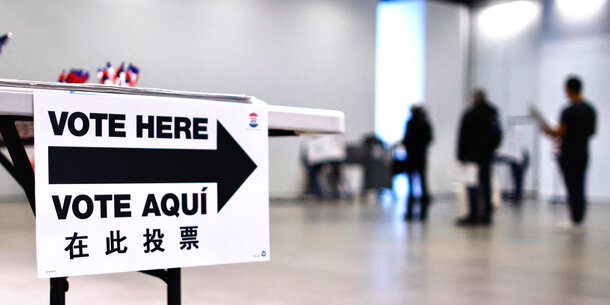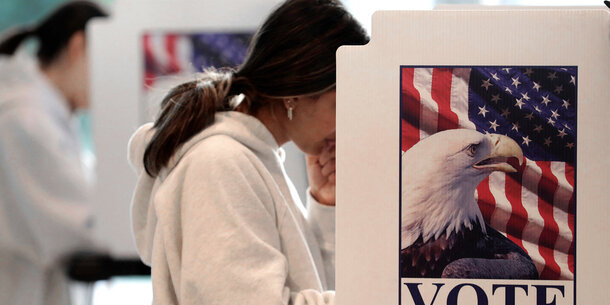You’re reading The Briefing, Michael Waldman’s weekly newsletter. Receive it in your inbox.
The first hundred days of Donald Trump’s presidency have been marked by power grabs, aggressive if chaotic attempts to upend the Constitution’s checks and balances. Now another strategy has begun to more clearly come into view: an unprecedented drive to undermine elections, just in time for the 2026 midterms.
Also emerging: a fierce response, a defense of voting rights that won an important early victory. How this fight unfolds will shape whether we have free and fair elections in 2026 and beyond.
On March 25, Trump signed an executive order purporting to take personal control over federal elections. Henceforth, he declared, American citizens would have to produce a passport or other citizenship document to register using the federal voter registration form. But roughly half of Americans don’t have passports. The “order” was stuffed with other misguided notions. For example, it instructed an independent agency to strip federal certification from previously certified voting machines, and it even ordered states to give Elon Musk’s DOGE team access to the voter rolls to search for “fraud.” (Hmm, what could possibly go wrong with that?!)
The Brennan Center went to federal court. Representing the League of Women Voters, together with allies, our attorneys argued that this was illegal and unconstitutional. Last week, Judge Colleen Kollar-Kotelly agreed. In a powerful 120-page opinion, she wrote, “Our Constitution entrusts Congress and the States — not the President — with the authority to regulate federal elections.” She issued a preliminary injunction blocking the key part of the executive order. (Other elements are still being litigated.)
The judge focused on the Constitution’s Elections Clause, which gives states the duty to set rules for the “times, places, and manner” of elections — and gives Congress the power to make national voting laws. That provision is the basis for the Freedom to Vote Act, the sweeping pro-democracy legislation that came within two votes of passing three years ago. It does not give a president any personal authority over elections, and certainly not the writ to act like a king.
The executive order came as part of a wide-ranging effort to undermine the vote. As my colleagues Sean Morales-Doyle and Lauren Miller Karalunas note, much of this strategy is set out in the Heritage Foundation’s Project 2025 policy blueprint — and it’s right on schedule. Next on the agenda is using the Justice Department to chill future efforts to safeguard elections.
The Guardian reported Monday that Justice Department leaders “have removed all of the senior civil servants working as managers in the department’s voting section and directed attorneys to dismiss all active cases, part of a broader attack on the department’s civil rights division.” The department itself was founded in large measure to protect the voting rights of Black formerly enslaved people after the Civil War, and the Civil Rights Division is considered a crown jewel. Now the cop has been pulled off the beat.
Already, the administration had purged the cybersecurity experts at the Department of Homeland Security who worked to protect voting systems. Trump even directed the Justice Department to investigate Chris Krebs, the esteemed expert he appointed to lead the cybersecurity office during his first term. Krebs’s infraction? He had affirmed the integrity of the 2020 election.
Krebs spoke out to raucous applause at a packed technology conference in San Francisco, his first public comment since being targeted. “Cybersecurity is national security,” he declared, adding, “To see what’s happening to the cybersecurity community inside the federal government, we should be outraged. Absolutely outraged.”
These efforts are reflected in the SAVE Act, which if enacted would be the worst voting law ever passed by Congress. It would require citizens to produce a passport or birth certificate to register or even to re-register — and as the Brennan Center’s research shows, 21 million Americans don’t have ready access to those documents.
The SAVE Act passed the House on a nearly party-line vote. Now it is before the Senate. Encouragingly, senators have vowed to block the measure, and if they stand firm, they have the votes to do so. Sen. Jon Ossoff (D-GA) called it a “bad faith bill cynically intended to disenfranchise millions of eligible voters.” Sen. Elissa Slotkin (D-MI) reiterated her opposition on Fox News, saying, “It makes it harder to have women vote, it makes it harder if you don’t have a passport.”
If the SAVE Act is defeated — if, in fact, it never comes to a vote — let’s not just move on. This would be a signal victory.
History doesn’t repeat, but it rhymes. The fight to vote has been a defining struggle throughout American history. Always, people have had to press to get or keep access to our democracy, and just as consistently, some have tried to shrink the circle.
We at the Brennan Center will take a moment next week to celebrate our work and the organization’s 30th anniversary. Our annual Brennan Legacy Awards dinner will honor Gov. Wes Moore of Maryland. And we will honor and hear from the Broadway musical Suffs, which tells the story of how women won the right to vote in the United States. Presenting our awards will be Celina Stewart, CEO of the League of Women Voters, our client in the recent lawsuit.
For most of the play, we see the contest between insider strategies and street protests, backstage strategists and charismatic public figures such as Inez Milholland. The racism that tried to keep Ida B. Wells from marching with her fellow suffragists down Pennsylvania Avenue and the powerful political leaders who tried to stop the expansion of the franchise.
The musical ends on a contemporary note. Today’s activists join with the suffragists, recognizing the need to fight for equality even when “you won’t live to see the future that you fight for/Maybe no one gets to reach that perfect day.” That song’s title is a good reminder of what we must continue to do at this moment of challenge: “Keep Marching.”






